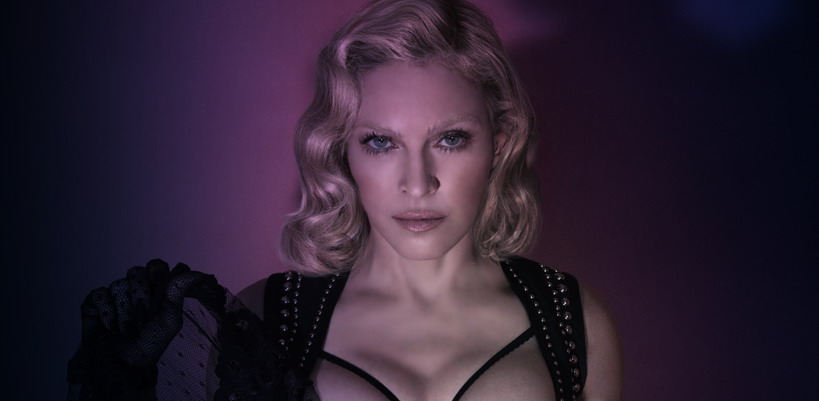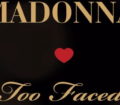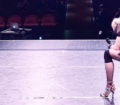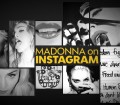
Madonna spoke about the album last week with the LA Times by phone from her home in New York, where she’d just sat down to a late dinner…
I hope you don’t mind that I’m eating. It’s potato soup with corn. So good.
The interview…
LA Times: As we’re talking, “Rebel Heart” is due to come out in about two hours. Does releasing an album feel like the end of the race or just the beginning?
Madonna: Oh my God, that’s the beginning. Well, you know what? It’s not the beginning. The beginning was the beginning. It’s the middle.
LA Times: The run-up to an album is much more intense now than it was a decade or two ago. You have to work harder earlier.
Madonna: There’s a lot more product out in the marketplace, and there are so many outlets that people have to hear music, whether it’s iTunes or SoundCloud or YouTube or whatever. So the combination of the technology and all the… What’s the word I’m looking for? I don’t want to say “talent,” necessarily, because not all of it’s talent.
LA Times: Competition?
Madonna: Is it competition? I don’t think that’s the right word, because I don’t make music like everybody else’s. But, yeah, if you release a record the same day some other big pop star releases a record, it’s probably considered competition.
LA Times: It’s competition for people’s attention, I think.
Madonna: That’s right.
LA Times: You told Rolling Stone recently that you miss the simplicity of the music business the way it used to be.
Madonna: Of course I do! Who wouldn’t?
LA Times: What was more simple?
Madonna: I made a demo, I took it to a nightclub, I gave it to a DJ, he played it, people danced to it, an A&R guy was there, he signed me, I made a record. Then my song – if everyone liked it, fingers crossed — was on the radio. It was just simpler. There wasn’t Twitter and Facebook and Snapchat. Even before MTV, there was really just live shows and the radio, and that was it.
LA Times: You also didn’t have situations where half your record leaks before you’re ready to put it out.
Madonna: Half of it? You mean all of it. Or practically all of it, in various incarnations. That’s part of the technology thing, which brings people perhaps a little too close.
LA Times: When that happened, you spoke frankly about how invasive it felt. Three months later, has that feeling diminished?
Madonna: Oh no, it’s still very fresh on my mind, and I’m still very upset about it.
LA Times: You don’t think the official album has supplanted the leak in people’s brains?
Madonna: I think their brains have been contaminated by what they’ve heard. And because I was continuously being hacked into – with all the different versions from all the different producers I was working with in all the different recording studios — it started making me second-guess everything. I had extreme anxiety.
Some of the demos that I had done, I actually liked as demos; I liked the simplicity of them. But then people were commenting on them: “Oh, I can’t wait to hear the finished version.” And I thought, Well, what if this is the finished version? And then other people were saying they liked things as demos that I had changed the production of.
In a way, it was almost like doing a test screening of a film. I went through this with my last film I directed, where the audience’s comments actually weighed in and gave Harvey Weinstein the right to say, “If you change X, Y and Z on your film, I’ll spend more money on the marketing.” But that’s not the movie I want to make. So from the point of view of the artistic process, it was devastating. And it still is.
LA Times: The focus-group thing you’re describing seems like such a drag.
Madonna: It’s a drag. But if you start hearing the same things over and over again, you start thinking, Well, maybe there’s some truth to it, and even though I don’t want to hear it, I should be paying attention to it.
At the end of the day, we should all be left alone to do our work and finish our paintings, so to speak, and when we’re ready to show our work, we show our work. Of course you invite the trusted opinion of people – your peers or people whose opinions you respect – and you say, “What do you think?” And sometimes you hear things you don’t want to hear. But what’s really strange is when it’s the entire world, and everyone starts weighing in. I did try very hard to shut everything down and not listen to what people said. But I am a human being after all.
LA Times: Something else that’s changed in the record industry is the role of the producer. Guys like Diplo and Kanye West are far more visible than producers used to be; they’re cultivating their own mythologies. Does that get in the way of what you’re trying to do?
Madonna: Not really. They both have strong opinions and a strong idea of what things should sound like, but so do I. And I think we all agreed to work with one another because we have a mutual respect for each other. And there was a clause built in for not necessarily agreeing on everything. But certainly I felt like Kanye made a very valid contribution to the production of the songs that he worked on. And Diplo, I spent a lot of time with him. I like the way he hears music; he draws on lots of different genres.
LA Times: No one was coming to your earlier records to hear what Patrick Leonard or Mirwais had to say, though. On this one, there’s some Kanye in the music.
Madonna: But those people weren’t personalities. Kanye’s an artist in his own right; so is Diplo. Mirwais is a very shy behind-the-scenes kind of person who doesn’t have an Instagram account. And Pat Leonard — I mean, he might have an Instagram account, I don’t know. But in those days it didn’t exist. They’re behind-the-scenes songwriter-producers; they’re not artists themselves, whereas Diplo and Avicii and Kanye and many of the people I worked with are.
LA Times: Well, exactly. That seems like a new method for you.
Madonna: It had its good points and its bad points. Obviously, the good thing about working with those people is being able to collaborate with them and their talent and tap into the way they look at music, hear music, feel music, create music. The downside is that they’re very busy people too, so getting them to stay in the room for more than eight hours – more than six hours! – was hard. They’re all over the place: multi-tasking, red-carpet events, “Oops, I’ve gotta go do my DJ gig now.” I had to share. I felt oftentimes like a child stomping my foot, going, “Where do you think you’re going? We haven’t finished this song yet!” I found myself bargaining with them.
LA Times: I assume that was a novel experience.
Madonna: It was. Diplo said to me, “You’re the only artist I actually sit in the studio with. Everyone else I just send them stuff.” Wow, OK, thanks a lot.
LA Times: One product of these various collaborations is that the album really embraces a sense of contradiction, even more than your work usually does. There are points where you move directly from one emotion to another that might be perceived as its exact opposite.
Madonna: Could you give me an example?
LA Times: Going from “Joan of Arc” to “Iconic.” That’s really two sides of a coin.
Madonna: A duality. A paradox.
LA Times: A paradox, right.
Madonna: Well, that’s what life is.
LA Times: And that’s something you want to capture in your music.
Madonna: I do. Because I think that’s the essence of life. Everything isn’t black and white; we live in the gray. And unfortunately everyone takes everything too literally. I can be as vulnerable as I can be a badass. And I’m not claiming that as my unique quality; I think other people can do that too. It’s just whether you can express it or not.
LA Times: Sometimes you squeeze that duality into one song — “S.E.X.,” for instance. To me that sounds like both an embodiment and a critique of a heavy-breathing sex jam. The words are super-raunchy; the beat slithers. But there’s something weirdly dispassionate in your voice.
Madonna: It’s detached.
LA Times: What’s that song saying?
Madonna: It’s kind of a social commentary about the way everybody hooks up now and the lack of intimacy. When I made my “Sex” book I was being incredibly ironic, but I was also saying, “Look, it’s not only a man’s place to objectify a woman — a woman can objectify herself too.” In the song “S.E.X.,” when I do the sort of rap in the middle and I do the list, I made myself sound like I have a lisp. Go back and listen to it. It’s meant to be ironic — even though there’s some very handy items on that list.
LA Times: “Holy Water” does that a little bit too. The double entendres are so over the top.
Madonna: At this point all my songs about sex have to be tongue in cheek. There’s no other way I can approach it. Since exploring sexuality has been such a big part of my career as an artist, I felt like I wanted to address it, but almost from a voyeuristic way, like I’m on the outside looking in.
LA Times: In a way these songs don’t even seem interested in pleasure. “S.E.X.” talks about breaking the bed, but you don’t sound like you’re having much fun.
Madonna: Hmm.
LA Times: There’s a loneliness to it, which I suppose is the voyeurism.
Madonna: I don’t think love is involved. But remember that I did the record with Kanye, and he has a very specific point of view about sexuality, which I find amusing. It’s not meant to be sexy.
LA Times: What if a listener doesn’t grasp that?
Madonna: Well, let’s face it: There’s lot of subtleties in life that are hard for most people to grasp. Don’t you think?
LA Times: “Joan of Arc” risks that too. It’s about the unseen struggle of a pop star, which some might find hard to sympathize with.
Madonna: I certainly didn’t write it from a victim’s point of view.
LA Times: But you know that some people will say, “Oh, boo-hoo.”
Madonna: Well, I don’t really care what they say. What the song says is, even though I am perceived as a person who is a superhero or who is immune to criticism, there are times when things that people say hurt me. And there are moments when a word of kindness can change everything for me. It’s just the truth. And if people have a problem with that, then they have a problem with that. I admire the conviction that Joan of Arc had. Although I’m sure she had her moments of terror and doubt, I admire that she stuck to her guns. I wish I could always be that way.
LA Times: Is that true, though? Because if you did—
Madonna: Because caring about what people think is the death of all artists, really.
LA Times: I get that. But some of the most effective moments on this record are the most vulnerable. What’s the difference between caring what people think and being vulnerable?
Madonna: Vulnerability just means you have feelings. That you feel. That you have empathy and compassion. That you’re not a sociopath. Life is confusing if you’re not a pop star or a celebrity or famous. You add that into the mix and it’s really confusing. But I think also that “Joan of Arc” isn’t necessarily the trials and tribulations of being famous. Perhaps all human beings can relate to it.
LA Times: But being famous gives the song its unique power. You’re talking about the experience of having strangers think they understand your life because they’re privy to certain public aspects of it. But maybe that doesn’t bug you out anymore.
Madonna: The thing is, I’ve been dissected and misinterpreted for over 30 years now. Sometimes I think about it; sometimes I don’t. Sometimes it shows up in my work; sometimes it doesn’t. Sometimes I want to speak about it; sometimes I don’t want to say anything.
LA Times: Does that determine to what extent you put lyrics in your songs that could be deciphered?
Madonna: Sometimes I like to be more coded and I don’t want to be specific. I want to be specific about feelings but I don’t want people to connect dots and start getting into tabloid kind of thinking. I like the idea that you can write a song about heartbreak or desire or falling in love, and even though it’s specific to you, other people can relate to it and say, “I know what that feels like.”
LA Times: Sure. But then I hear a song like “Unapologetic Bitch,” which totally invites us to speculate on who you’re addressing.
Madonna: Sometimes you’ve got to do that. Especially when the song has that crazy-ass bass line.
LA Times: The bass line made you do it.
Madonna: Blame it on the bass.
Madame X is available in Box Set, CD, Vinyl and Cassette!
Get your copy HERE!





